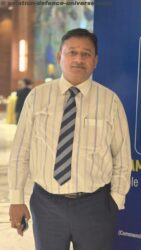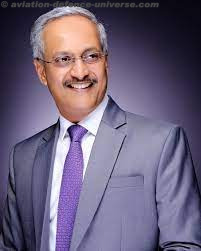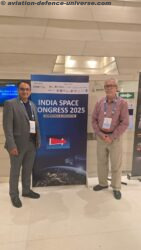New Delhi. 02 July, 2016. “We are forecasting improvement for performance of 2016 over 2015. We are looking for an industry profit globally this year from 39.4 billion dollars, which will be a record level. Some of the factors of course the low fuel price is helping but overall the industries in a more zillion condition than it was some time ago and it’s in a better structure, airlines raw more officially, the load factors are up using more efficient equipment, so generally speaking despite certain economic background the airlines are producing some good results, “ stated Tony Tyler, Director General & CEO, International Air Transport Association (IATA) in a written interview to Aviation & Defence Universe.
The International Air Transport Association (IATA )is a trade association of the world’s airlines. Consisting of more than 260 airlines, primarily major carriers, representing 117 countries, the IATA’s member airlines account for carrying approximately 83% of total Available Seat Kilometers air traffic. IATA supports airline activity and helps formulate industry policy and standards. It is headquartered in Montreal, Canada with Executive Offices in Geneva, Switzerland.
“About 3.8 billion dollars of airline money is stuck in Venezuela and unable to be repatriated and remitted to back to airlines’ home countries. That number remained pretty much the same for last certainly 12 months because airlines have stopped selling in the country and local currency. Its accused form of airlines, we saw Lufthansa decided only this last week to pull out of Venezuela, Air Canada decided that some time ago, every airline operating there has reduced capacity significantly in its frequency. This can’t be doing the country any good because what it needs is connectivity to trade with the rest of the world and we call on the government to release the funds and that airlines get their operating cost back,” he added.
IATA was formed in April 1945 in Havana, Cuba. It is the successor to the International Air Traffic Association, which was formed in 1919 at The Hague, Netherlands. At its founding, IATA consisted of 57 airlines from 31 countries. Much of IATA’s early work was technical and it provided input to the newly created International Civil Aviation Organization (ICAO), which was reflected in the annexes of the Chicago Convention, the international treaty that still governs the conduct of international air transport.
“Overall, it’s a very safe time for the industry, I mean last year’s safety performance beat the 5 year average and although of course we had a couple of terrible tragedies last year which were not accidents they were caused deliberately by human action. What we’re doing as IATA is we are tightening up our IATA operations safety audit which has become a global benchmark and safety management for some 400 of the world’s top airlines. That’s now becoming a system of continual assessment and a continual safety management rather than just a snapshot every couple of years and we are encouraging governments all around the world to adopt it as a part of their regulatory regime,” Tyler said.
The Chicago Convention couldn’t resolve the issue of who flies where, however, and this has resulted in the thousands of bilateral air transport agreements in existence today. The benchmark standard for the early bilaterals was the 1946 United States-United Kingdom Bermuda Agreement. IATA was also charged by the governments with setting a coherent fare structure that avoided cut-throat competition but also looked after the interests of the consumer. The first Traffic Conference was held in 1947 in Rio de Janeiro and reached unanimous agreement on some 400 resolutions.
“ Of Course government in the short time needs to make sure they’ve got enough resources to keep the lines moving. In the medium term though what we need to do is prevent these lines from happening in the first place and we have a programme, we call smarter security which aims to do that by working with the airports. We are working with airports council international to implement new technologies to visual all risk based systems of security screening so that we can actually get rid of these lines altogether by doing thing a bit smarter. We need to improve facilitation at airports, we need to go for more alternative systems, and we need to make sure that everybody can have his boarding card on his mobile phone or print it out at home so he doesn’t have to queue up at a check in desk,” he suggested.
Safety is the number one priority for IATA. The main instrument for safety is the IATA Operational Safety Audit (IOSA) and its successor, Enhanced IOSA. IOSA has also been mandated at the state level by several countries. In 2012, aviation posted its safest year ever. The global Western-built jet accident rate (measured in hull losses per million flights of Western-built jets) was 0.20, the equivalent of one accident every 5 million flights. Future improvements will be founded on data sharing with a database fed by a multitude of sources and housed by the Global Safety Information Center. In June 2014 the IATA set up a special panel to study measures to track aircraft in flight in real time. The move was in response to the disappearance without trace of Malaysia Airlines Flight 370 on 8 March 2014.
“The industry wants a global market base measure to help manages its carbon emissions. It wants that because really that’s its license to grow. This industry needs to grow, it wants to grow, but we have to manage our carbon emissions which is why we have set the target of carbon neutral growth from 2020. To deliver that we need governments to deliver as ICAO in its tri annual assembly in September-October this year. How confident am I? Well, I’m hopeful, I’m also reasonably confident but there is a lot of work to be done to bring governments into alignment before we can say with 100% confidence that we going to get that,” Tony felt.
According to him congestion also needs to be looked into. “Home printed bag tags, we now have a standard for those, we are trying to get those adopted so that people won’t be queuing up to drop their bags off, the bag will already be tagged before they even get to the airport. If we can reduce the amount of congestion, the amount of queuing, we will also reduce the vulnerability of airport crowds, to terrorist outrages like we saw in Brussels,” he said.
“The airline industry makes today’s modern life possible. We enable so much in the way of economic development and social development. It’s impossible to think of an industry in any country that isn’t affected by aviation, doesn’t depend on aviation. There’s more than that, it is also the life blood of social development and interaction. I mean not just for people who want to go on a holiday, although that’s really important, but for families to stay connected, for businesses to stay connected, for people. People want to explore the world and its aviation that makes that possible so in all these ways this aviation is a huge force for good,” ended Tyler.


























































































































